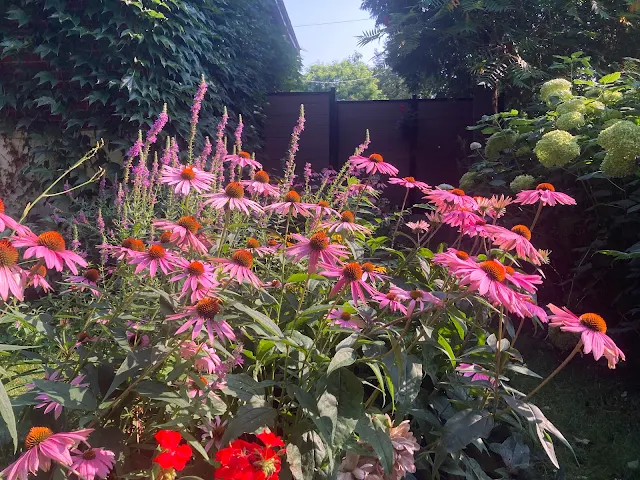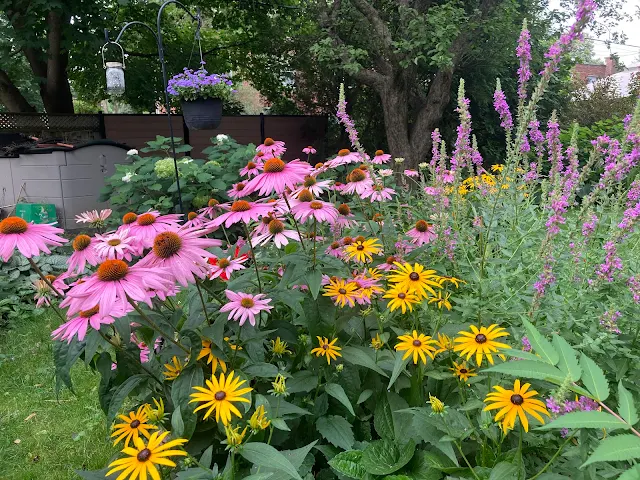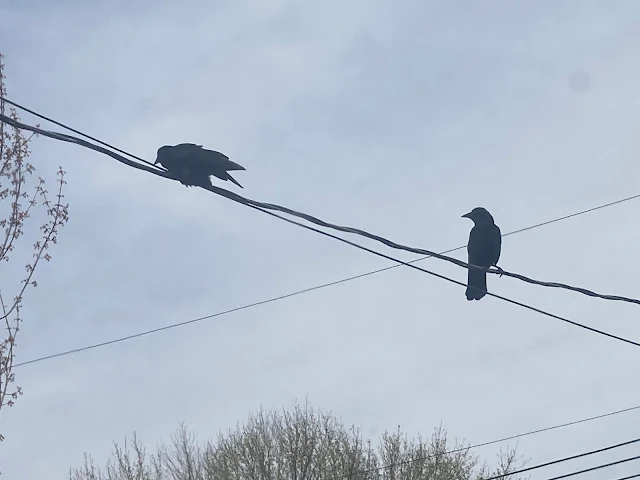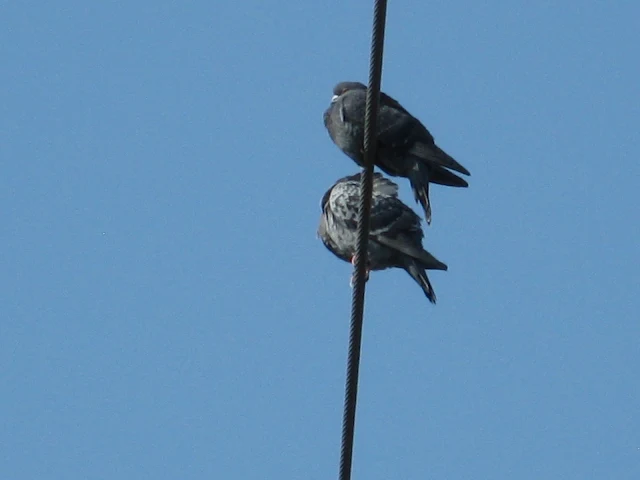Monday, July 29, 2024
Sunday, July 28, 2024
Saturday, July 27, 2024
“Fishing on the Susquehanna in July” by Billy Collins
 |
| Vancouver, 2010 |
Thursday, July 25, 2024
This brings me happiness
22 July 2024. There is a feeling of peace sitting in the garden. Well, that should be obvious, I guess . . . but it isn't. Here we sit with the comings and goings of insects, butterflies, and birds, here we sit on a summer day, mid-afternoon, our presence isn't needed, the insects, butterflies, and birds have work to do. Now honey bees visit the garden, you didn't see many of them a few years ago. If the climate is changing, and it seems to be, then let it stop at this. We never had snails before, up to last week we had many snails. And cardinals are now seen and heard everyday, even in winter we have cardinals, and they were few and far between just a few years ago. Now I hear and see them everyday; what happened? On the news it is said that they are plentiful (while other birds are diminishing in number) because there are so many bird feeders in Montreal. Really? I wonder. Let's not spoil things with politics, even though it's difficult not to drop a few comments, but if you want peace, turn off the radio, turn off the TV, leave your IPhone in a drawer, be with nature.
Tuesday, July 23, 2024
This brings me happiness
This is the best year for the garden! It has taken time, six? seven? years to become established; some things take time and you just have to be patient. I can see how I could have sped things up; for instance, instead of planting a few cone flowers each year and waiting for them to spread, I could have bought five or six, or more, and this would have made the garden fuller, more established, sooner rather than taking so many years. But live and learn, and learning by oneself is without the input of other people. I love to walk or sit in the garden, surrounded by flowers and bushes, and the insects and butterflies are plentiful; I think to myself that I have made this a home, or a place to visit, for them. Every day I see birds visiting the bird bath and this brings me a lot of happiness, I don't get in their way, I stay quiet, I observe them from the dining room window, and I think to myself that I have made this a place they can visit. If you make your garden a place where insects, butterflies, and birds want to visit then they will come; a barren yard, just grass, isn't all that inviting for them. A barren yard, just grass, needs a few flowers to make it inviting; a garden is almost like a room in one's home, it is an extension of one's home.
Sunday, July 21, 2024
"Won’t Get Fooled Again" by The Who
With our children at our feet
And the morals that they worship will be gone
And the men who spurred us on
Sit in judgement of all wrong
They decide and the shotgun sings the song
Take a bow for the new revolution
Smile and grin at the change all around
Pick up my guitar and play
Just like yesterday
Then I'll get on my knees and pray
We don't get fooled again
We knew it all along
We were liberated from the fold, that's all
And the world looks just the same
And history ain't changed
'Cause the banners, they all flown in the last war
Take a bow for the new revolution
Smile and grin at the change all around
Pick up my guitar and play
Just like yesterday
Then I'll get on my knees and pray
We don't get fooled again, no, no
If we happen to be left half-alive
I'll get all my papers and smile at the sky
For I know that the hypnotized never lie
Looks any different to me
And the slogans are effaced, by-the-bye
And the parting on the left
Is now parting on the right
And the beards have all grown longer overnight
Take a bow for the new revolution
Smile and grin at the change all around
Pick up my guitar and play
Just like yesterday
Then I'll get on my knees and pray
We don't get fooled again
Don't get fooled again, no, no
Meet the new boss
Same as the old boss
Friday, July 19, 2024
My YouTube video of a Cardinal at our bird bath
I made this video on July 7, 2024, and posted it the same day.
Wednesday, July 17, 2024
The promise of the 15 Minute City

I'll move myself and my family aside
If we happen to be left half-alive
I'll get all my papers and smile at the sky
For I know that the hypnotized never lie--The Who, “Won't Get Fooled Again"
Here is a definition of the 15 Minute city, from a Wikipedia article; it is
an urban planning concept in which most daily necessities and services, such as work, shopping, education, healthcare, and leisure can be easily reached by a 15-minute walk, bike ride, or public transit ride from any point in the city.[4] This approach aims to reduce car dependency, promote healthy and sustainable living, and improve wellbeing and quality of life for city dwellers.
The 15 minute city sounds lovely, we can all live in small communities and have all the amenities of life within walking distance, no cars, no traffic, no hustle and bustle, no hassle! Only pollution free air as we ride our bicycles waving to each other, to the fellow walking on the sidewalk by a florist shop where he stops to converse with the shop owner and buy a few roses for his partner. It is all happiness and community living! And if you suggest the opposite, that the 15 Minute City is a nightmare waiting to happen, a way to control the movement of the population, you are a right wing conspiracy nut. But that is exactly where we know the 15 Minute City is leading, we all know it; for instance, a CBC article published on 26 June 2024 reads "Edmonton promises residents 'freedom of movement' to calm concerns around 15-minute cities".
Urban planners have not solved the problem of homelessness so why would we believe they can provide the utopia of a 15 minute city? We saw how major cities in China, during the covid episode, isolated parts of cities with walls and guards, the movement of inhabitants were strictly controlled, some were kept isolated in their apartments and were supplied with groceries only out of the kindness of relatives and friends, some went hungry. Some people managed to escape and buy groceries outside of the area of their very real imprisonment. The 15 Minute City is ideal for times of pandemics, it is designed for limiting people's freedom of movement, and limiting information being communicated from one group to another. It is also a time for the abrogation of freedom of speech.
What we now have in all of our cities — homelessness, unemployment, and food insecurity —won’t be solved by the 15 minute city; there is no quick fix for these social problems and the 15 Minute City won’t change this, it will only make it easier to control people. It occurs to me that some 15 minute cities will be homeless encampments, isolated to protect the inhabitants of other 15 minute cities from poor people, drug addicts, and people labelled undesirable by what remains of the middle class. We already have this, it is part of urban living. Problems that aren't solved now won't be suddenly solved by the 15 minute city; they will only continue and get worse. This is common sense.
In different ways our society is disintegrating, what we had is a thing of the past and what we are left with is the detritus of the past. For instance, in Canada we live in fear of losing our family doctors, the family doctor is increasingly a thing of the past as is the middle class and the aspirations of the middle class: too many people can no longer afford to buy a house in which to raise their family, some can't afford to rent an apartment; a growing number of people are unemployed and unhoused; food banks can't keep up with the growing number of people using their services; there are a growing number of people who are addicted to fentanyl and other drugs. The 15 minute city is a fairly shallow diversion from these growing problems; the old society has collapsed and the new society is one defined by globalization and progressive ideology. We are deluged with immigrants, they are cheap labour, just when citizens can't find work and are criticized for not taking low paying jobs; in the 1980s and 1990s we exported our jobs to the Third World, now we are importing the Third World to work here. Under the present regime our population has exploded to 41M people; the floodgates for immigration are open and yet our society can't house, employ, or feed our current population.
A study at McGill University (from McGill’s Institutional Communications, 21 June 2024) is redefining the 15 Minute City,
Published in the Journal of Urban Mobility, the study examines travel behaviour and geospatial data from Montreal and finds, contrary to expectations, that only a small fraction of households can feasibly meet all their daily needs within 15 minutes of home using active transportation.
"Our study challenges the notion of a one-size-fits-all approach to urban planning,” says Ahmed El-Geneidy, Professor at McGill University’s School of Urban Planning. “While the 15-minute city concept has gained momentum globally, our research emphasizes the importance of locally relevant strategies that consider the diverse needs and realities of communities."
The research suggests a 30-minute model may be more realistic for North American cities, provided appropriate urban-design changes are made. Furthermore, the researchers underscore the need for urban-sustainability strategies that address not only travel behaviours but also neighborhood characteristics, household dynamics and social equity concerns.
If the 15 minute city becomes a 30 minute city, and then the 30 minute city becomes the 60 minute city, then what we have is what we already have, a “city” with the same problems that we are now facing. The 15 minute city is about social control and keeping citizens isolated; don’t be fooled again, it is a false utopia as are all utopias, nothing else.
Addendum: in this article published on 27 August 2024 citizens of Brandon, Manitoba, fear the 15 minute city will be imposed on them.
Monday, July 15, 2024
"I taught myself to live simply" by Anna Akhmatova
 |
| 2022 |
I taught myself to live simply and wisely,
to look at the sky and pray to God,
and to wander long before evening
to tire my superfluous worries.
When the burdocks rustle in the ravine
and the yellow-red rowanberry cluster droops
I compose happy verses
about life's decay, decay and beauty.
I come back. The fluffy cat
licks my palm, purrs so sweetly
and the fire flares bright
on the saw-mill turret by the lake.
Only the cry of a stork landing on the roof
occasionally breaks the silence.
If you knock on my door
I may not even hear.























































